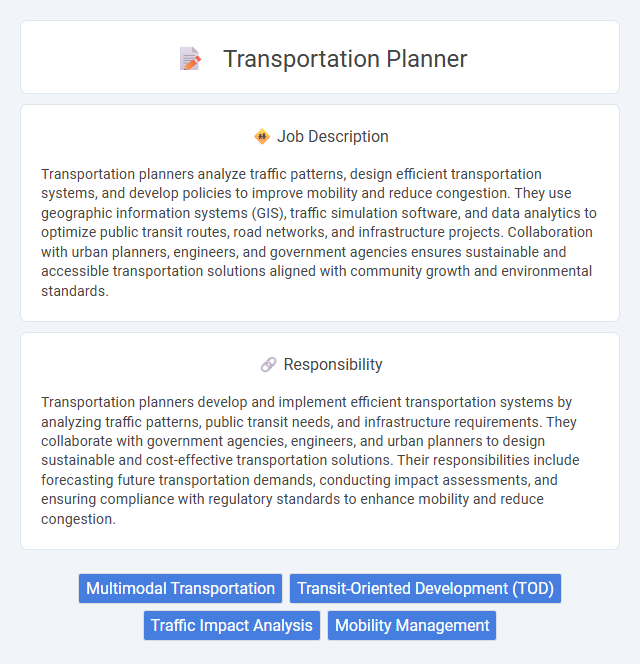
Transportation planners analyze traffic patterns, design efficient transportation systems, and develop policies to improve mobility and reduce congestion. They use geographic information systems (GIS), traffic simulation software, and data analytics to optimize public transit routes, road networks, and infrastructure projects. Collaboration with urban planners, engineers, and government agencies ensures sustainable and accessible transportation solutions aligned with community growth and environmental standards.
Individuals with strong analytical skills and a passion for urban development are likely to excel as Transportation Planners. Those comfortable with data analysis and strategic thinking may find this career fitting, while people preferring more hands-on or interpersonal roles might feel less suited. The job probably requires adaptability to evolving transportation technologies and policies, favoring candidates who embrace continuous learning.
Qualification
Transportation Planner jobs require a strong background in urban planning, civil engineering, or geography, often supported by a bachelor's or master's degree in these fields. Proficiency in transportation modeling software such as TransCAD, ArcGIS, and AutoCAD is essential for data analysis and project design. Candidates must demonstrate skills in traffic forecasting, infrastructure development, and policy evaluation to create efficient, sustainable transportation systems.
Responsibility
Transportation planners develop and implement efficient transportation systems by analyzing traffic patterns, public transit needs, and infrastructure requirements. They collaborate with government agencies, engineers, and urban planners to design sustainable and cost-effective transportation solutions. Their responsibilities include forecasting future transportation demands, conducting impact assessments, and ensuring compliance with regulatory standards to enhance mobility and reduce congestion.
Benefit
Working as a Transportation Planner likely offers competitive salaries and opportunities for career advancement within urban development sectors. There is a strong probability of gaining expertise in sustainable practices, which are increasingly valued in public and private transportation projects. Benefits may include collaborative work environments and the chance to impact community mobility and environmental outcomes positively.
Challenge
Transportation planner roles likely involve complex challenges in balancing infrastructure demands with environmental sustainability. The probability of facing unpredictable urban growth patterns requires adaptive strategies and innovative problem-solving skills. Managing resource constraints while optimizing transit efficiency may be a consistent difficulty in this position.
Career Advancement
Transportation planners play a critical role in designing efficient, sustainable transit systems that support urban growth and reduce environmental impact. Career advancement opportunities include positions such as senior transportation planner, project manager, or transportation director, often requiring expertise in geographic information systems (GIS), data analysis, and public policy. Professionals who develop skills in multimodal transportation planning and stakeholder engagement are well-positioned to lead complex infrastructure projects and influence regional transportation strategies.
Key Terms
Multimodal Transportation
Transportation Planners specializing in multimodal transportation design and implement systems integrating various modes such as buses, trains, bicycles, and pedestrian pathways to enhance urban mobility. They analyze traffic patterns, land use, and demographic data to develop efficient, sustainable transport networks that reduce congestion and environmental impact. Expertise in geographic information systems (GIS), travel demand modeling, and public transit operations is critical for optimizing multimodal infrastructure projects.
Transit-Oriented Development (TOD)
Transportation Planners specializing in Transit-Oriented Development (TOD) design efficient, sustainable urban transit systems that maximize accessibility and reduce reliance on private vehicles. They analyze land use patterns, demographic data, and transit ridership to create integrated plans that promote walkable communities around transit hubs. Expertise in TOD ensures the development of mixed-use neighborhoods fostering economic growth, environmental benefits, and enhanced public mobility.
Traffic Impact Analysis
Transportation Planners specializing in Traffic Impact Analysis evaluate how new developments affect traffic flow and congestion patterns. Using data-driven models and GIS technology, they assess roadway capacity, predict traffic volumes, and recommend mitigation strategies to ensure efficient transportation networks. Their work supports urban planning by optimizing infrastructure design and enhancing public safety through informed decision-making.
Mobility Management
Transportation planners specializing in mobility management design and implement strategies to optimize urban transit systems, reduce traffic congestion, and enhance rider accessibility. Their work involves analyzing travel patterns, coordinating multi-modal transportation options, and promoting sustainable alternatives such as biking, carpooling, and public transit. Effective mobility management leads to improved environmental outcomes, increased commuter satisfaction, and more efficient use of infrastructure resources.
 kuljobs.com
kuljobs.com